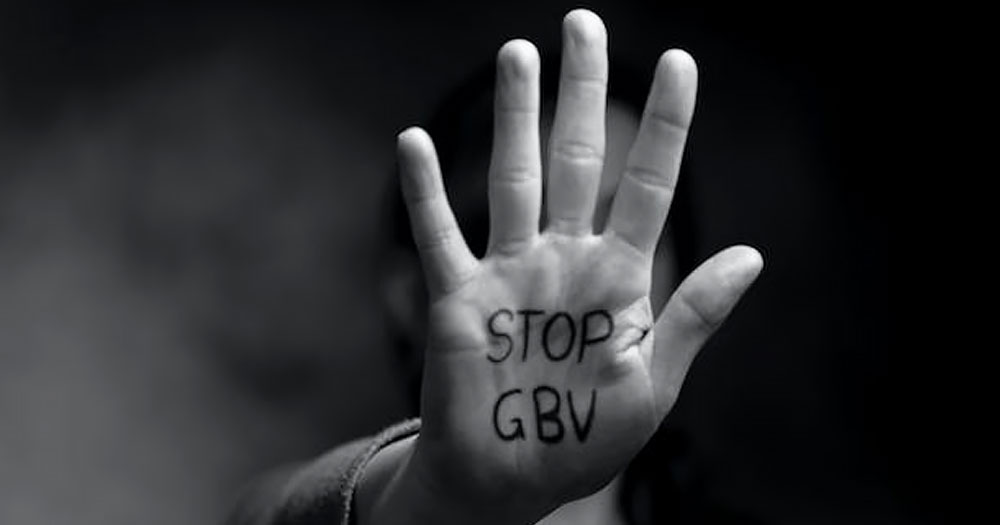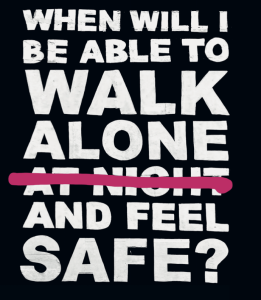In the wake of the murder of Ashling Murphy, an extreme rise in cases and what seems like a disproportionate number of reports of violence against women, conversations surrounding gender-based violence in Ireland have rightly entered the news cycle again.
While it is beneficial to discuss this issue on a national scale, there are still a concerning number of people who believe these events are random acts of violence and who call for more policing as the primary way to combat them. In contrast, there are many people in various marginalised communities who understand gender-based violence as a symptom of the Irish State, as something that is exacerbated by a variety of other problems and as something that cannot be easily solved through individual blame and violent crackdowns from police.
Some of those interviewed decided to provide first names only.
Red Umbrella Front are a grassroots collective of Irish sex workers and sex workers in Ireland fighting for full decriminalisation and their right to live safely. They talked about how the Irish state perpetuates gender-based violence against sex workers.
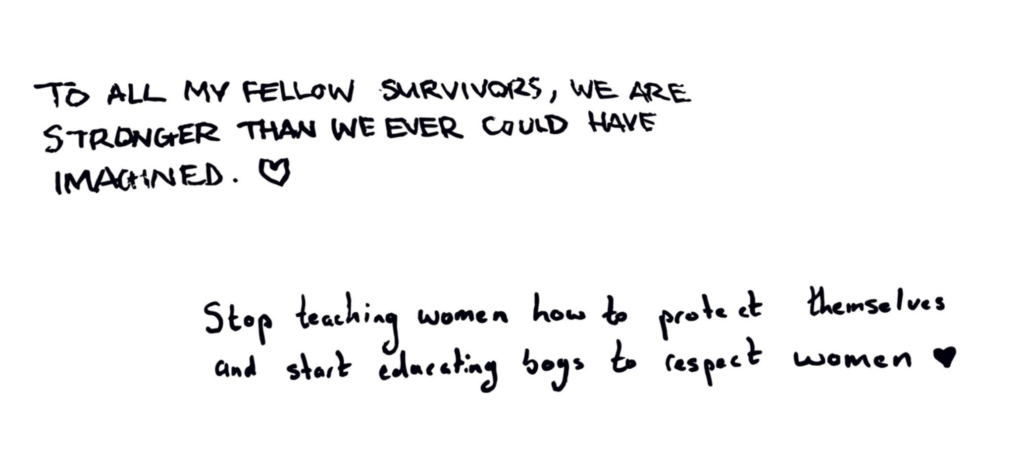
Adeline: The free state has a horrific history of gender-based violence, I mean it was engineered around gender-based violence. It was engineered around rolling back women’s rights making it so they couldn’t leave an abuser, they couldn’t work outside the home, they took away contraception, abortion, Ireland was constructed around gender-based violence through the partnership of the church and the state, and it is ongoing. Think of the Magdalene laundries. We can’t have a country where the Gardaí and the Government joined forces to enslave women and traffic their children and not expect that to show up in the culture.
Red Umbrella Front’s Radical Demands: pic.twitter.com/3MBgm8HJwN
— Sex work in Ireland (@SexWork_Ireland) December 4, 2021
In Ireland, the church has been allowed to direct this narrative of fallen women. Ireland will drive women and marginalised people to poverty and inequality and when they resort to sex work, they are considered a subclass.
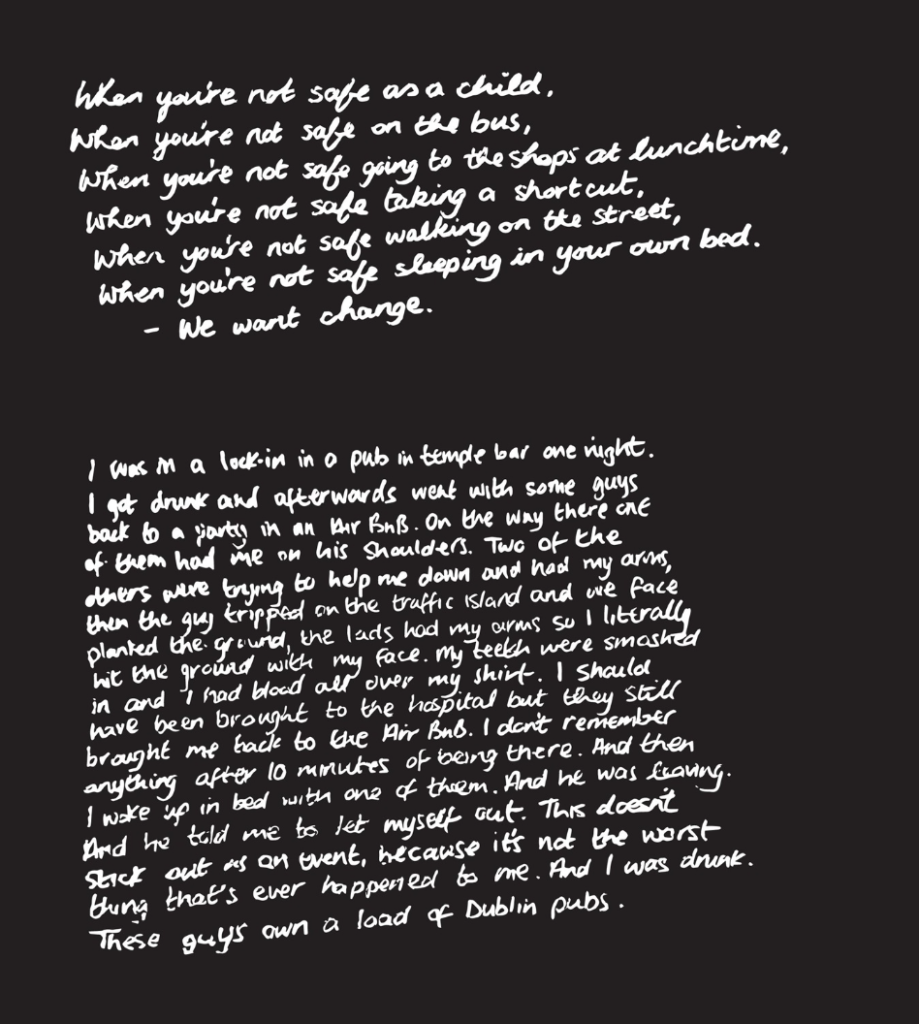
ON THE CRIMINALISATION OF SEX WORK AND GENDER-BASED VIOLENCE
Adeline: The Gardaí really are the violence against sex workers. We (Red Umbrella Front) have suffered violence at the hands of the Gardaí. We were raided and evicted by the Gardaí; it did not make us safer. It led to us planning our own suicides. The Gardaí make sure we are not allowed to rent. If you have a roommate, you can be charged with being a pimp because you’re technically living off the proceeds of a sex worker, your landlord will be pressured to evict you, which is what happened with us. We were raided, harassed and intimidated.
I’ve spoken to more than one sex worker who had been raped who was afraid to bring it to the Gardaí for fear of making things worse. I brought this up with two senior Gardaí and they both jumped up and started pounding the table- which is terrifying in itself- shouting ‘how can we make things worse?’ and when I said, well you can evict them for starters’, they both sat down and looked at me saying, ‘well we have to evict them,’ and that is violence.
As a result of this criminalisation, you’ve got women suffering terrible things because they are afraid of what will happen if they show their face or speak up about it. There are people we know who really want to speak to journalists, but they can’t because they’re so terrified. They will agree and then back out because they are terrified, terrified they are going to lose all their support and housing. The fact that you can’t speak up for those fears is gender-based violence.
NEW REPORT: “We live within a violent system.” Structural violence against sex workers in Ireland – this is what our research found (Thread) ?#decrimforsafety #rightsforsexworkers pic.twitter.com/AXBDMo2exq
— Amnesty Ireland (@AmnestyIreland) January 25, 2022
ON CHANGES TO MAKE GOING FORWARD
Adeline: It’s not simple, it’s lots of things. Like we need mental health services, the conversation on mental health is so far behind in Ireland. Part of that is because it’s rich people that become mental health professionals. There’s no reason for the Irish government not to take the money they pour into religious NGOs and use it to fund sex workers to go through university and become mental health professionals. […] We could be putting people through university – from Direct Provision, from the Travelling community, disabled people, Trans people – to help their own communities.
Ronan: And we have to stop blindly supporting these sexual violence crisis centres and organisations that are backed by the church. They don’t have space for sex workers, and I can’t trust someone that doesn’t. If you don’t have space for sex workers, are you telling me you have space for a drunk woman who got raped who was not the perfect victim?
Because that’s ultimately what they’re perpetuating.
If they aren’t accepting sex workers, they are not accepting anyone who isn’t the perfect woman. It is misogyny, it is transphobia, and it runs deep. Irish civil society is so mixed up in church and state, you go to any of these services that are supposed to help but they’re funded by the church, and they pull you back into their mindset.
MERJ (Migrants and Ethnic-minorities for Reproductive Justice) are a collective of migrant women of colour who began as a group campaigning for abortion rights but have evolved into an abolitionist collective engaging with all radical politics in Ireland.
Thread of thank yous:
We want to thank everyone for their support with the Black Lives Matter event today. Thank you to everyone who donated food and water; to the volunteers, stewards, legal observers, family and comrades, the speakers – the incredible Black speakers. 1/6 pic.twitter.com/oUVhm43Q3X— MERJ Ireland (@merj_ireland) June 6, 2020
Emily: When it comes to gender-based violence, it’s really hard in my mind to separate gender from everything else because the truth is, as Kimberly Crenshaw taught us, that gender looks different for women of colour than it does for white women, for Traveller women…this intersection of being racialised and a woman or a minority gendered person changes your experience.
When cases like the horrific case of Ashling Murphy happen I think a lot of people are moved and talk about that as gender-based violence, that’s what we understand as gender-based violence, but I think it’s critical to understand that this is not one action, not the action of one bad man, that this is systemic and it looks different based on what other material conditions you are actually dealing with. And as we have seen, the sympathy for gender-based violence only comes for a certain kind of victim as well.
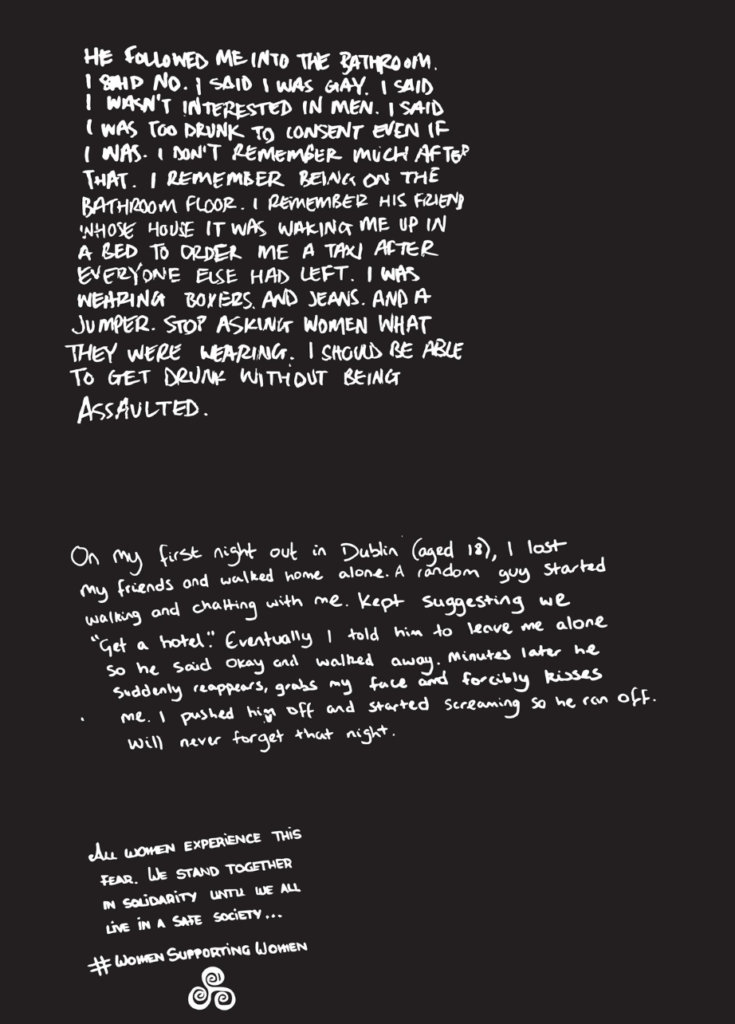
ON POLICE ACTION AS A RESPONSE TO GENDER-BASED VIOLENCE
Emily: As MERJ we’re abolitionists so that means we reject any carceral solutions that are given. It is important to remember when we’re talking about gender-based violence that the state is one of the main perpetrators of this violence. So, it feels counterproductive to look at the state as a protector from gender-based violence. We know guards are racist, sexist, homophobic by their own admission really, we also know there are higher instances of domestic violence in households where there are police. While prison guards commit horrendous acts of sexual violence against women in prisons, we are told that we need to be afraid of trans women in prison.
Emily: I think because we’re taught the police are there to protect you, the first thing you see when any kind of harm happens is people telling you to call the guards or report to the guards. I think people do that in good faith not thinking through what the consequences of that will be. Maybe the consequences won’t be for you but for other people. I think sometimes people call the guards not necessarily for their own safety but for others, like people having a mental health crisis, we use the guards as this panacea for everything that is difficult to deal with in life and often that makes it so much worse and escalates situations. We aren’t putting any kind of blame on people that are assaulted and call the guards, of course you would, that’s what you’re told to do.
Increasing malnutrition rates. Rising tensions over limited resources. Protection risks. Increased gender-based violence. Labour exploitation.
The impact of not having enough funds for our work is expected to be massive and far-reaching. pic.twitter.com/fvHifbtFqz
— UNHCR, the UN Refugee Agency (@Refugees) November 22, 2022
But we don’t think of the consequences and even the justice system as part of the carceral state and what that looks like. When someone is looking for justice after being assaulted or harmed by justice, they mean harsh prison sentences. And what does that do for the harm that’s been done actually? And that as abolitionists is where we’re trying to get people to think. Don’t just take the standard route that has been given to you because who has it been given to you by?
ON POSSIBLE ALTERNATIVE RESPONSES
Emily: Start thinking about, what is it that I actually need right now? What are the consequences of acting on those needs? Who is best placed to de-escalate the situation and get me safe? And if I am safe or if I’m not safe but it is after I’ve been harmed, what do I need after I’ve been harmed?
Does it do any good for that person to go to prison for my harm? Is that going to help me in the aftermath or is it just going to reinforce itself and actually do no one any good?
K: I’ve been in a situation recently involving sexual violence and it was solved through a community situation where some people in my community who were not involved in what happened went between me and the person who perpetrated and mediated. I made the decision not to interact with that person anymore but that person still has a connection with other people in the community so they’re not shut out like they would be if you were punishing, people are still caring for them, but I feel cared for as well because I don’t have to take on the burden of interacting with them and putting myself in harm’s way again.
Lovely day for a march on the boss! ☀️✊ pic.twitter.com/b3GlD5Z9Zg
— CATU Ireland (@CatuIreland) November 18, 2022
Michelle Byrne is a long-time community activist and avid trade unionist with a background in student campaigning. She is involved with Unite, CATU and Waterford for Change. She spoke about gender-based violence on the Debenhams pickets and the relationship between gender-based violence and Workers Rights.
Michelle: It was mostly women on those pickets, the vast majority, 90 percent involved in that, and there was a very problematic state-sanctioned response to protect capital. At the height of that, on the Waterford picket we had some of the guards come down and physically lift women in their sixties out. At one stage I was being lifted out and my top was pulled up in front of crowds of people. There was no care there.
There were women there a couple of years off retirement fighting to get their redundancy package being carried off in front of crowds of people with almost the same number of guards there as people. The response was let’s have a little chat with you first to see if we can convince you. When that didn’t work it was; okay let’s bring out these paramilitary style Gardaí. This was after they had essentially kettled us where the sit down was taking place. It seemed like such an over excessive use of police intimidation and force.
There were lots of layers to the violence here. ‘You’re in a trade union and that goes against what we stand for’, and then ‘as women how dare you stand up for your rights in a capitalist society even though you own that money’. It was a very purposeful interaction saying ‘we’re here to protect capital. We are happy enough to pick these women up off the ground but protect these scabs over here who just so happen to be men in trucks who are being directed by KPG’ which in my experience is mostly men in suits. There are so many layers, like men told us to do this and now mostly men, as the Gardaí were mostly men, are reacting to this, going up against a bunch of older women who are trying to defend their rights as workers.
#16DaysofActivism Against Gender-Based Violence is an annual international campaign that kicks off on the 25 of November to 10 December as the International Day for the Elimination of Violence against Women.#UniteInEndingViolence#SADCYouth pic.twitter.com/4SSQO2omZK
— @SAYoF_Gender & Young Women Development (@SAYoF_Gender) November 22, 2022
ON GENDER BASED VIOLENCE AND WORKERS’ RIGHTS
Michelle: Maybe typically you wouldn’t think ‘oh I’m joining a union to combat gender-based violence’ but you are joining to tackle the results of exploitation under capitalism and to me the two are connected. There’s lots of instances where trade unions are trying to raise gender issues to try and fight back and scratch away at these problematic norms in the workplace.
For example, as workers leave work at night many hospitality workplaces don’t provide taxis home even though they probably have a duty of care to their staff to make sure that they get home safe when they’re in unsafe positions leaving their establishment. Although, we have to understand that all of these inequalities are happening under capitalist notions of what a workplace should be and is going to continue until we rebalance that essentially.
Not to be reductive but at the end of the day, if you are still supporting capitalism, you are supporting a lot of the structures that lead to gender-based violence. If we want to fight gender-based violence we have to really think about anti-capitalism. Capitalism exists on inequality and obviously that ties into the patriarchy that puts men and women on unequal footing and we need to look at what that means – gender norms and gender stereotypes and how those feed into the violence that occurs.
We have to think about the bigger picture as well, like yes, we can think about the things that we need to do right now in relation to, say, I’ve heard people asking is it porn? Is it violent video games? But those things are the small little outcomes of the much wider problem of patriarchy and capitalism. Hopefully people will make that connection and realise that this is much bigger than just turn off the games or restrict porn. There are positive things that can be done immediately but if we’re not looking at the root causes of this, we’re going to be constantly fighting little fires without actually tackling the cause of the fire.
This story originally appeared in GCN’s March 2022 issue 370. Read the full issue here.
© 2022 GCN (Gay Community News). All rights reserved.
This article was published in the print edition Issue No. 370 (March 1, 2022). Click here to read it now.
Support GCN
GCN is a free, vital resource for Ireland’s LGBTQ+ community since 1988.
GCN is a trading name of National LGBT Federation CLG, a registered charity - Charity Number: 20034580.
GCN relies on the generous support of the community and allies to sustain the crucial work that we do. Producing GCN is costly, and, in an industry which has been hugely impacted by rising costs, we need your support to help sustain and grow this vital resource.
Supporting GCN for as little as €1.99 per month will help us continue our work as Ireland’s free, independent LGBTQ+ media.
